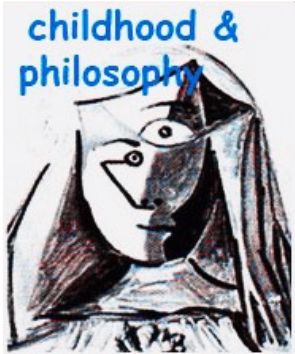inverting questions: an invitation to take a stroll on another side of questions
DOI:
https://doi.org/10.12957/childphilo.2023.70547Keywords:
inversion, anastrophé, questions, rhizome, Deleuze.Abstract
This paper has two objectives: to explore how inverting questions in the Community of Philosophical Inquiry (Kennedy, 2004) can be a useful tool for triggering thought processes; and, more generally, to explore the importance of inverting the role traditionally given to children as bystanders to their own education and thought processes. On this basis, we will assume that children have an epistemic and political voice and that this voicing, placed on equal standing with the adult voice, is long overdue. It is undeniable that questions have a central role in P4C sessions (Costa-Carvalho E Mendonça, 2020; Costa-Carvalho E Kohan, 2020) and that, in the context of any given community of philosophical inquiry, they can trigger (Kennedy, 2004) a wide range of thought processes. Some questions may be too vague and require sharpening to adequately address the problem at hand, while others may promote a metacognitive approach to the issue under discussion, and to the entire thought process that sustains it. We will explore how inverting questions may be useful in this context. Moreover, we will consider how this thought anastrophé may emerge in concrete philosophical discussions with children. Our argument will, therefore, navigate the intersection between language and thought, logic and semantics, and theory and practice. Assuming that the term “inversion” may offer different understandings, we will try to outline this rhizomatic approach (Deleuze and Guattari, 1987) to the concept. We will focus primarily on the child’s point of view, which we hold to be epistemologically privileged (Kennedy, 2020). It is our core belief that children´s voices should be granted scientific and political standing and that an epistemic inversion between adulthood and childhood in education must be explored.
References
Agamben, G. (2008) Infância e História – Destruição da experiência e da origem da história. Belo Horizonte: Editora UFMG.
Bergson, H. (1999). Introduction to Metaphysics, Hackett Publishing Company, Indianapolis.
Blackburn, S. (1997). Dicionário de Filosofia, Gradiva, Lisboa.
Bobzien, S. (2003) “Logic”. In Inwood, Brad. (Ed.) The Cambridge Companion to The Stoics. Toronto: Cambridge University Press.
Cohen, F. S. (1929). “What is a question?” The Monist, 39 (3), pp. 350–364.
Costa Carvalho, M.; Kohan, W. (2018). “Da árvore e do rizoma: pensar para além do método o encontro da filosofia com a infância”. Revista Educação e Filosofia, 32(65).
Costa Carvalho, M.; Mendonça, D. (2020). “As potências do perguntar”. In Costa Carvalho, Magda Filosofia para Crianças.Rio de Janeiro: NEFI Edições.
Davies, B. (2014) Listening to Children: Being and becoming. Routledge: New York.
Deleuze, G., & Guattari, F. (1987) A Thousand Plateaus. Minneapolis: University of Minnesota Press.
Deleuze, G. (1990) The Logic of Sense. London: The Athlone Press.
Gardner, S. (2011) “Questioning to Hesitation, rather than Hesitating to Question: a Pragmatic Hermeneutic Perspective on Educational Inquiry”, Philosophy Study. 1(5), pp. 352-358.
Haynes, J.; Murris, K. (2012). “Escuta, hospitalidade e ensino filosófico”. In Xavier, Ingrid M., & Kohan, Walter O. (Ed.), Filosofar: aprender, ensinar. Autêntica Editora: Belo Horizonte.
Kennedy, D. (2004). "The philosopher as teacher. The role of a Facilitator in a Community of Philosophical Inquiry". Metaphilosophy, 35 (5), pp. 745-765.
Kennedy, D. (2006) Changing Conceptions of Childhood from the Renaissance to Post-Modernity: A Philosophy of Childhood. New York: The Edwin Mellen Press.
Kennedy, D. (2020) A comunidade da Infância. Rio de Janeiro: NEFI Edições.
Kohan, W. (2002). “Entre Deleuze e a Educação: Notas para uma política do pensamento”. Educação & Realidade, 27 (2), jul./dez. 2002, pp. 123-130.
Lindop, C. (1992) “Relationships”. In Sharp, Ann Margaret, & Reed, Ronald F. (Ed.). Studies in Philosophy for Children - Harry Stottlemeier’s Discovery, Philadelphia: Temple University Press. pp. 128-134.
Lipman, M. (1994) A Descoberta de Aristóteles Maia. Lisboa: Edições Colibri
Lipman, M. (1997) “Thinking in Community”. Inquiry: Critical Thinking Across the Disciplines, 16 (4), pp. 6-21.
Lipman, M. (2003) Thinking in Education. Cambridge: Cambridge University Press.
Matthews, G. B. (1980) Philosophy and the young child. Cambridge: Harvard University Press.
Splitter, L. & Sharp, A. M. (1995) Teaching for Better Thinking. Melbourne: Acer.
Passos, E.; Kastrup, V. & da Escóssia, L. (Org.). (2009) Pistas do Método Cartográfico: pesquisa-intervenção e produção de subjetividade. Porto Alegre: Editora Sulina.




